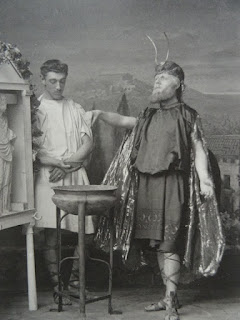The Wasps (422 BCE) by Aristophanes is a satire of juries, not really of the functioning of the Athenian judicial system but of the old men who spend their time pursuing spots on juries. They want the thirty bucks a day, they like the sense of power, but mostly they remind me of the retirees who spend their day getting worked up by cable news, except in Athens they got to vote at the end of each story. As Procleon, the central old fellow and jury addict, complains:
PROCLEON: [My son] won’t allow me to go to court; he won’t let me do any harm to anybody. He wants to give me a good time, he says. I’ve never heard such nonsense. I don’t want to be given a good time. (50, tr. David Barrett)
A recognizable figure, walking, or sitting, among us today. Anticleon, the son, is right but also wrong,
as he learns by the end. Maybe he was
better off when dad was in front of the television, rather than appearing in
front of juries himself for the crime of enjoying life with too much gusto.
The social and political detail in this play, by the way, is
phenomenal. How much of our knowledge of
ancient Greek life is owed to Aristophanes?
The wasps of the title are the chorus, the other old men and
hangers on who, as jurors in a democracy, have a sting in their tail that they
would not have in other political arrangements.
Athens is described allegorically as a wasp hive by the head wasp:
Observe our social structure and you’ll see it conforms
To that of wasps exactly – we are organized in swarms… (78)
An unusually explicit explication of the conceit.
I have included a couple of photos from an 1897 Cambridge
performance of the play, archived here, just to get a look at one of the wasps.
We have had four Aristophanes plays in a row, one per year,
which has let us see a separate ongoing story, the fight between Aristophanes
and the audience, as voiced here by the head wasp, complaining about the third
place finish of The Clouds the previous year:
O once again your Champion fought for you
And sought to purge the land of grievous ills.
And what did you do then? You let him down.
For when he tried last year to sow a crop
Of new ideas, you failed to see the point,
And all was wasted; yet, with hand on heart,
He swears by Dionysus that in fact
There never was a better comedy.
The shame is yours for being so obtuse. (76)
And here we have, in the old Cambridge performance, two dogs
on trial for eating a cheese:
FIRST DOG: Don’t you acquit him, do you hear? He’s a monophagist, that’s what he is, an eat-it-all-your-self-ist. He’s the most confirmed monophagist in the whole history of dogkind. (71)
The Wasps is less ragged and wacky than The
Acharnians or The Knights, but there is still plenty of room for the
goofy stuff.
Next week we end this amazing run of thirteen plays in
eleven years with Peace (421 BCE) by Aristophanes. Can there be peace? Yes, it turns out, briefly. I do not remember this as one of the best of
Aristophanes, but it does feature a guy riding a dung beetle to heaven; do you
want to miss that?



I am so glad to be taking part in this project, and just loved "The Wasps". This has been a revelatory series of plays for me, and I am so grateful to all involved.
ReplyDeleteClare Shepherd published the above comment.
DeleteThanks! I have been learning a lot, too.
ReplyDelete